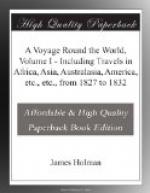It is astonishing that the Portuguese, who have been so enterprising, and expended so much money on their early discoveries in the erection of fortresses, many of which may still be considered good modern fortifications, should now allow most of their foreign possessions to go to decay, and even to fall into ruins. Look at the once celebrated city of Goa on the Malabar coast, dwindled into insignificance, and proverbially called a city of priests and beggars. What is the cause of this decadence? Is it a just visitation for the unjust means they practised to acquire those possessions? All for the thirst of gold! Or is it that the active spirit of the Portuguese ceases with the acquisition of novelties, and that they are destitute of those persevering qualities which improve and foster the possessions that are originally obtained by enthusiasm and energy?
We had frequent heavy showers during our stay at Cape Coast, although this was not the regular rainy season, for these showers were what are called the after-rains, which last about a fortnight.
When the weather clears up after very heavy rains, many of the poor people, principally old women and children, take up the mud from the gutters, and wash it well in calabashes, when they generally find a few grains of gold for their pains. This is also the case after a very heavy surf has subsided which, during the violence of the storm, generally throws up a great quantity of black mud on the shore.
There is a strange exhibition to be witnessed every morning on the sea-shore, which, however, I shall forbear to describe.
There is a singular old man, upwards of 60 years of age, at Cape Coast Castle, who is well known by the name of Dr. Saguah, and who acts in the capacity of a native doctor. This person excites a great deal of attention, not only by the peculiarity of his manners, but by the circumstances through which he has reached a station of some consideration. He was originally a slave to the African Company at Cape Coast, and having been accidentally placed in the house of the medical establishment, he learned to compound medicines. In the duties which he performed in this capacity he rendered himself very useful, and continued at the pestle and mortar until Sir Charles McCarthy’s arrival, when the African Company was dissolved, all their slaves liberated, and the new charter proclaimed, (for Sierra Leone and Cape Coast) on March 29, 1822. Having received his freedom, he now assumed a position of some importance, and was retained on the medical establishment as dispenser, with a small salary. His excellent conduct and judgment in the discharge of his new office procured him the general respect and confidence of Europeans, and his reputation, when I was at Cape Coast, stood so high that he was frequently consulted on the diseases of the climate in preference to medical gentlemen from Europe. He is in the habit of making daily visits to all the European residents,




